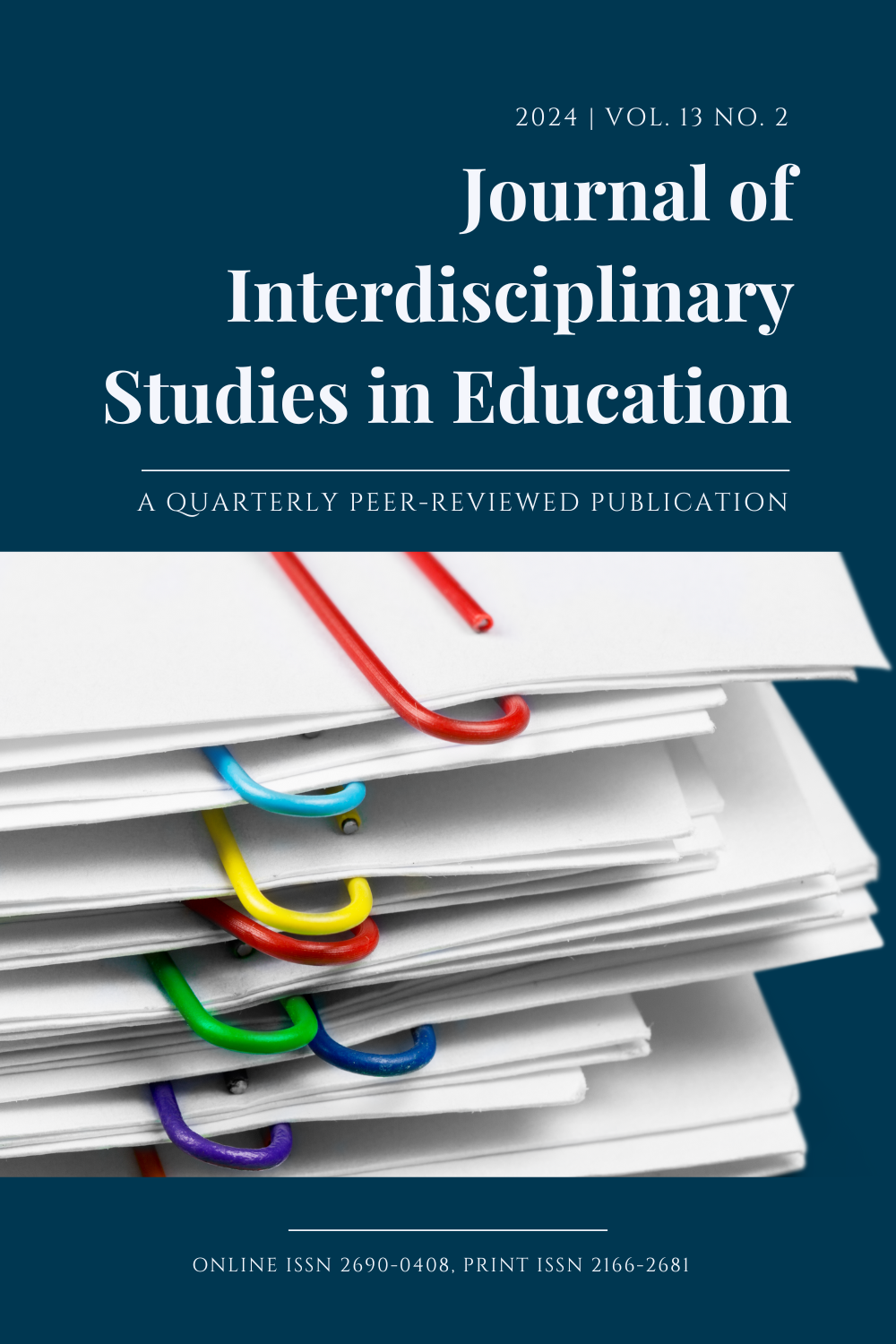Integrating Akan traditional art to enhance conceptual understanding in mathematics
Perspectives of educators and artisans
DOI:
https://doi.org/10.32674/0xy2cm48Keywords:
Akan Culture, Artefact, Conceptual understanding, Culturally Relevant Pedagogy, Geometry, CraftsmanshipAbstract
The purpose of the study was to investigate how the Akan culture promotes conceptual understanding of geometry in senior high schools. The study area was the Ashanti region, which houses a chunk of the Akan people. The targeted population for the study included experienced mathematics teachers and people well-versed in Akan traditional art. Using purposive and snowball sampling methods, ten participants were recruited, including seven experienced mathematics teachers and three craftsmen. Data was collected through interviews to elicit in-depth information from participants using a semi-structured interview guide. The data was analysed using thematic analysis. One major theme and four sub-themes were identified, indicating that to achieve conceptual understanding, teachers make use of learners’ experiences as they build new knowledge, which enables learners to transfer the knowledge to new situations as they apply the knowledge. We therefore conclude that the Akan culture has connections with geometry, and teachers are encouraged to adapt the school geometry to the Akan culture. We also encourage more research in the area of ethnomathematics to widen the scope.
Downloads
References
Akan people. (2023, March 16). Encyclopedia Britannica. https://www.britannica.com/topic/Akan
Albanese, V. (2021). Bundles of Ethnomathematical Expertise Residing with Handicrafts, Occupations, and Other Activities Across Cultures. Handbook of Cognitive Mathematics, 1–34.
Amir, M. Z., Urrohmah, A., & Andriani, L. (2021). The effect of application of realistic mathematics education (RME) approach to mathematical reasoning ability based on mathematics self efficacy of junior high school students in Pekanbaru. Journal of Physics: Conference Series, 1776(1), 012039.
Arthur, Y. D. (2019). The Effect of Background on Students’ Interest in Mathematics: The Mediation of Students’ Motivation and Perception in Ghana. Asian Journal of Probability and Statistics, 1–13. https://doi.org/10.9734/ajpas/2019/v5i330135
Arthur, Y. D., Dogbe, C. S. K., & Asiedu-Addo, S. K. (2022). Enhancing Performance in Mathematics Through Motivation, Peer Assisted Learning, And Teaching Quality: The Mediating Role of Student Interest. Eurasia Journal of Mathematics, Science and Technology Education, 18(2), em2072. https://doi.org/10.29333/ejmste/11509
Atta, S. A., & Bonyah, E. (2023). Teaching mathematics for social justice: The challenges and the prospects in the Ghanaian senior high schools. Journal of Mathematics and Science Teacher, 3(1), em033. https://doi.org/10.29333/mathsciteacher/13082
Bonner, E. P. (2021). Practicing culturally responsive mathematics teaching. Mathematics Teacher: Learning and Teaching PK-12, 114(1), 6–15.
Byrne, D. (2022). A worked example of Braun and Clarke’s approach to reflexive thematic analysis. Quality & Quantity, 56(3), 1391–1412. https://doi.org/10.1007/s11135-021-01182-y
Carr, M. E., Davis, E. K., & Seah, W. T. (2023). An exploration of Ghanaian students’ valuing in mathematics: How does it evolve across school levels? EURASIA Journal of Mathematics, Science and Technology Education, 19(10), em2332.
Clements, D. H., Sarama, J., & Joswick, C. (2022). Learning and teaching geometry in early childhood. In Special Issues in Early Childhood Mathematics Education Research (pp. 95–131). Brill.
Fouze, A. Q., & Amit, M. (2017). Development of mathematical thinking through integration of ethnomathematic folklore game in math instruction. Eurasia Journal of Mathematics, Science and Technology Education, 14(2), 617–630.
Gil-Glazer, Y. (2020). Visual Culture and Critical Pedagogy: From Theory to Practice. Critical Studies in Education, 61(1), 66–85. https://doi.org/10.1080/17508487.2017.1292298
Hu, C.-P., & Chang, Y.-Y. (2017). John W. Creswell, Research Design: Qualitative, Quantitative, and Mixed Methods Approaches. Journal of Social and Administrative Sciences, 4(2), Article 2. https://doi.org/10.1453/jsas.v4i2.1313
Kothari, C. R. (2017). Research Methodology methods and techniques second edition. New Age.
Lerman, S. (2014). Encyclopedia of mathematics education. Springer Dordrecht.
Meaney, T., Trinick, T., & Allen, P. (2021). Ethnomathematics in education: The need for cultural symmetry. Handbook of Cognitive Mathematics, 1–29.
MOE, NaCCA. (2019). Ministry of Education Ghana New Curriculum. National Council for Curriculum Assessment (NaCCA)
Nur, A. S., Waluya, S. B., Rochmad, R., & Wardono, W. (2020). Contextual Learning with Ethnomathematics in Enhancing the Problem Solving Based on Thinking Levels. Journal of Research and Advances in Mathematics Education, 5(3), 331–344.
Owusu-Darko, I., Apoenchir, H. K., & Mensah, J. Y. (2022). Mathematical Constructs–What are These, and Their Interconnection with Ethnomathematical Concepts. Indonesian Journal of Ethnomathematics, 1(2), 89–104.
Owusu-Darko, I., Sabtiwu, R., Doe, F., Owusu-Mintah, B., & Ofosu, E. K. (2023). Akan ethnomathematics: Demonstrating its pedagogical action on the teaching and learning of mensuration and geometry. Journal of Mathematics and Science Teacher, 3(2).
Porter, A., Graham, S., Myles, F., & Holmes, B. (2022). Creativity, challenge and culture in the languages classroom: A response to the Ofsted Curriculum Research Review. The Language Learning Journal, 1–10.
Rizqika, P., & Shofyan, A. (2021). The development of learning tool based on realistic mathematics education and its influence on spatial abilities of elementary school students. Journal of Physics: Conference Series, 1839(1), 012013.
Rosa, M. (2020). An overview of diverse mathematical practices in Brazil: An ethnomathematical perspective in action. Ethnomathematics in Action, 3–22.
Sharna, S., Sharma, S., Doyle, P., Marcelo, L., & Kumar, D. (2021). Teaching and learning probability using games: A systematic review of research from 2010-2020. Waikato Journal of Education, 26(2), 51–64.
Turugari, M. (2022). Integration of ethnomathematics in the teaching of probability in secondary school mathematics in Zimbabwe [PhD Thesis].
Additional Files
Published
Issue
Section
License
Copyright (c) 2024 SETH AMOAKO ATTA

This work is licensed under a Creative Commons Attribution-NonCommercial-NoDerivatives 4.0 International License.







